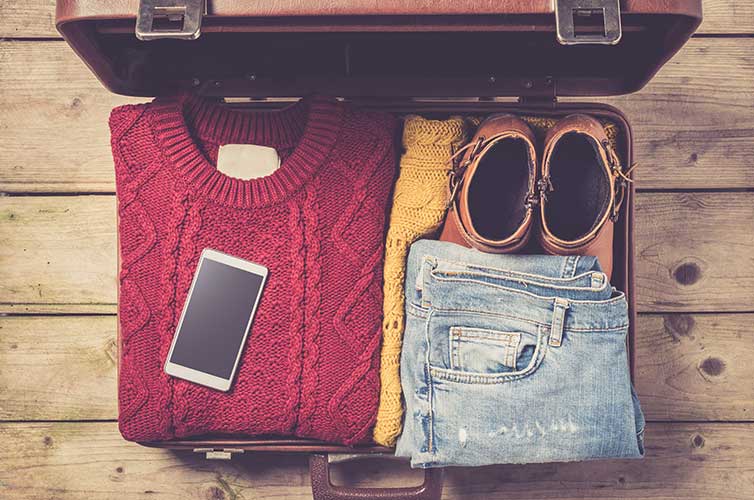Traveling during cold and flu season means spending a lot of time in a confined space with other people (and other people’s germs), so it can be easy to get sick. Even when it’s no longer cold and flu season, it can be easier to catch a bug when you’re traveling for a number of reasons. Here’s our list of the best ways to stay healthy while traveling, no matter what season it is.
Pack the essentials

Keep yourself healthy by traveling with the essentials: hand sanitizer, disinfectant wipes, vitamins and immune-boosters. Washing/cleaning your hands and similarly, disinfecting the spaces you’re using (or things you touch often) will help a lot in preventing you from getting sick while traveling (or anytime).
Follow good cold and flu prevention tips.
We can’t say it loud enough: wash. your. hands. Colds and the flu are easy to catch during the winter, but they’re even easier to catch when you’re traveling. Follow good hygiene practices like washing your hands regularly (and/or using hand sanitizer), avoiding touching your face, getting plenty of sleep, exercising and eating well, and so on. The regular practices that prevent common colds can also prevent bigger problems when traveling.
Watch the CDC for updates.

When you’re planning on traveling, you should always check the CDC for up-to-date information on health updates you need to know. Avoid traveling to areas that are experiencing outbreaks and know what medicines/vitamins/vaccines you need before traveling. If you’re traveling to an area that frequently has water- or food-borne illnesses, pack preventive measures. Water-purifying water bottles and any medicines your doctor recommends in case you encounter a case of traveler’s stomach can help keep you healthy.
Wear a mask if you’re sick (or nervous).
If you’re a bit under the weather, wear a mask to prevent the further spread of your cold. If you’re nervous about getting sick while you travel, you can also wear a mask to protect yourself against airborne germs coming your way. Surgical or antiviral face masks can help. Make sure you get a mask that is well-fitting and offers the right amount of protection. Just know that experts say washing your hands and following other health measures are the best ways to protect yourself.
Watch what you eat.

If you’re traveling somewhere that frequently has water- or food-borne illnesses, make sure you do your research in advance to learn the risks. Then take care to avoid them while traveling! Don’t drink the water if it’s not safe. This includes avoiding ice, not brushing your teeth with tap water, and avoiding raw fruits/veggies that may have been washed in contaminated water. Avoid raw or under-cooked fish or meat and make sure that your food is served hot and hasn’t been sitting out for long periods of time. If you’re eating from a street vendor, make sure it looks clean and is popular among locals and tourists alike.
Wipe down public spaces.
Now, we don’t mean to suggest that you should spray down every surface with Lysol before you set your backpack down. But bring some disinfectant wipes with you when you travel and wipe down the tray table, TV screens, armrests and headrest of your seat on the plane. In addition, it doesn’t hurt to give your most-used items a quick wipe down every once in a while too. Phones, tablets and laptops in particular can harbor tons of germs.
Get plenty of sleep and take care of yourself.

Sorry to say it, but if you sleep two hours a night during the whole vacation and only eat (delicious) fried food every day, you won’t be doing your immune system any favors. Whether you’re trying to fight off regular season colds, travel bugs, or something else, basic rest and some good fruits and veggies will help a lot. Pro-tip: if you find allergies flaring up after arriving at a new destination, try to eat some local honey. Honey often contains small amounts of local pollen that can help your body adjust to the new allergens.
Take your vitamins.
While you’re traveling, it’s always a good idea to boost your immune system when you can. Immune-boosters like elderberry, vitamin C and D, and zinc can all be helpful in boosting your immune system or fighting off colds. Some people also like to take supplements like Airborne or Emergen-C to boost vitamin intake. Just remember not to overdo it and always follow recommended dosage of any vitamins or supplements you take!
Bring (and use!) sunscreen and a water bottle.

The easiest way to ruin a beach vacation is by getting a major sunburn—or worse, sun poisoning—the first day. This is especially easy if you’re going from a relatively cold climate to a very sunny one. Drink PLENTY of water, take a break from tanning and enjoy some shade once in awhile and wear sunscreen. Make sure you reapply your sunscreen every few hours too!
Have more questions about staying healthy while traveling? Check out our Instagram for more tips.


